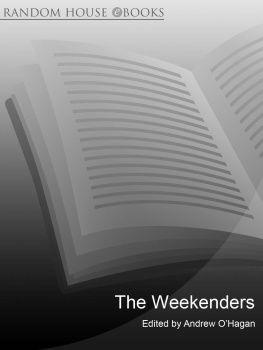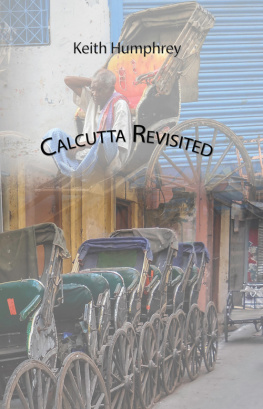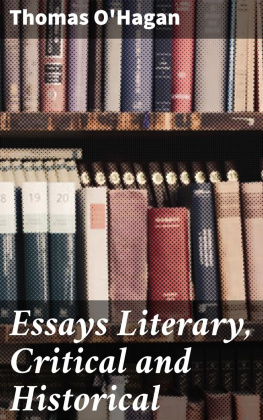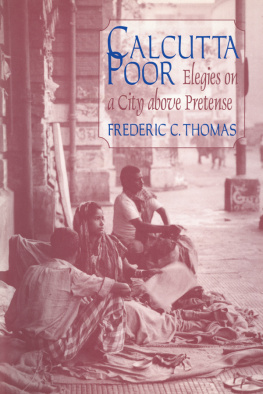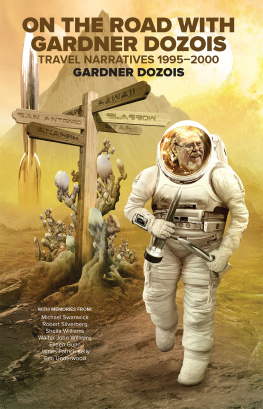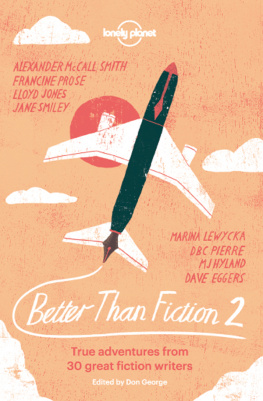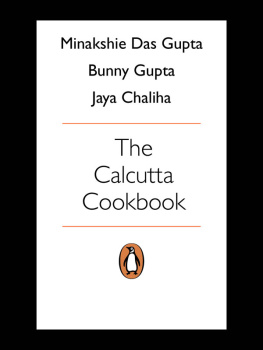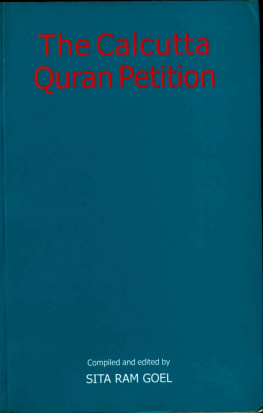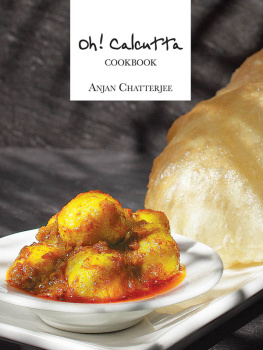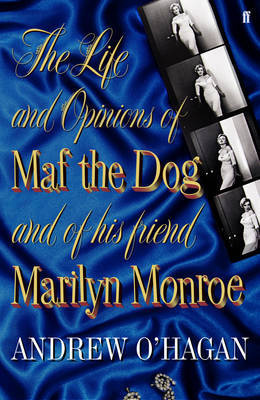Contents
About the Book
WANTED: ELEVEN WRITERS TO TAKE THE TRIP OF A LIFETIME, TO A CITY YOU WILL NEVER FORGET
Following their adventures in Africa, the Weekenders, a diverse group of our most exciting writers, this time travel to India to uncover the beating heart of a city like no other Calcutta.
What will writers as different as Monica Ali, Bella Bathurst and WF Deedes make of this vibrant and extraordinary metropolis?
How will Irvine Welsh transfer his tales to the mean and dirty streets of this incredible city?
What will Jenny Colgan discover about Indias place in the modern world as she spends her afternoons nattering with the women at the beauty salon?
And how will Tony Hawks react to being dragged down Calcuttas overcrowded roads in a rickshaw?
Together with Simon Garfield, Michael Atherton, Sam Miller, Victoria Glendinning and Colm Toibin, these writers have been taken to the heart of one of the worlds most intriguing and contradictory cities. Where wealth and poverty live sides by side. Where the intensity of heat, noise and smell can overwhelm the senses.
The result is an incredible collection of short stories and evocative travel writing. With the Weekenders as your companions you will explore and experience a mystical and compelling city like no other on Earth.
About the Authors
ANDREW OHAGAN was born in Glasgow, Scotland and was shortlisted for the Scottish Writer of the Year award for The Missing. Our Father was shortlisted for the Booker Prize and the Whitbread First Novel Award. In 2003 he was nominated one of Grantas Best of Young British Novelists.
BELLA BATHURSTS first book, The Lighthouse Stevensons, was a non-fiction book about Robert Louis Stevensons family of lighthouse engineers. Her second book, a novel, Special, was published in 2003.
W.F. DEEDES is a columnist and former Editor of the Daily Telegraph. He is the Bill of Private Eyes Dear Bill letters. He is the author of At War with Waugh and Brief Lives.
COLM TOIBIN is one of Irelands most celebrated authors. Among his novels are The Heather Blazing and The Blackwater Lightship, which was shortlisted for the Booker Prize in 1999.
MONICA ALIS debut novel Brick Lane was shortlisted for the Booker prize, the Guardian First Book Award and the Orwell Prize, and received a WH Smith Peoples Choice Award. She was nominated one of Grantas Best of Young British Novelists in 2003.
VICTORIA GLENDINNING has written biographies on Anthony Trollope, Vita Sackville-West and Rebecca West and has also published a number of novels, The Grown Ups, Electricity and Flight.
SIMON GARFIELD is a prize-winning journalist and author of, amongst others, The Nations Favourite: The True Adventures of Radio 1 and Mauve which was described in the Daily Telegraph as a book about science which also happens to be a miniature work of art.
IRVINE WELSHS books have made him a cult figure within the writing world since the 1990s. Several of his books have become best sellers and all have a mixture of comedy, drama and hard-hitting issues. He has written Porno, Trainspotting, The Acid House and Filth.
SAM MILLER Sam Miller is a journalist and writer based in Delhi. He was previously head of the South Asia region at the BBC World Service, and has worked as a journalist, producer and manager in television, radio and online. He is also a widely published writer on the politics and culture of the Indian subcontinent.
MICHAEL ATHERTON became captain of the England cricket team at 25 and is one of the most successful batsmen in the game. He played professional cricket for Lancashire and England for 15 years. His autobiography Opening up was published in 2002.
JENNY COLGAN is a best-selling novelist. Born in Ayrshire, her novels include Amandas Wedding and Looking For Andrew McCarthy.
TONY HAWKS is the author of Round Ireland with a Fridge, which was followed by Playing the Moldovans at Tennis, both books inspired by obscure bets.
Acknowledgements
The decision to publish this book was made on the night that the first Weekenders won the WH Smith Travel Book Award. The charity to whom the royalties had gone, had an event that same evening and we moved seamlessly from one to the other, celebrating at both. When the hangovers receded we were left with the serious decisions of how and where. In both, we were lucky.
Firstly, Andrew OHagan, whose short story had been so compelling in the first book, agreed to edit Weekenders 2. Andrews brilliant and deliberately light hand on the tiller transformed this project. His understanding of tone and pace, his ability to direct the authors without stifling their freedom and his sheer enthusiasm made this book the success it is; all the authors loved working with him and it is to Andrew that Weekenders 2 owes the greatest debt.
Secondly, the choice of Calcutta as our destination proved perfect. It offered the two things we needed most: a rich source of inspiration and a network of friends whose knowledge, help and good company made it possible to see and do more in five days than most visitors achieve in five months.
All the writers from the first book were asked to contribute and new authors were sought. Bill Deedes, who played the lead role in selecting writers first time around, was introduced to Monica Ali by Andrew at the Hay on Wye literary festival. He asked her to join us and she responded immediately, saying that on her one visit to Calcutta she had found it to be more Indian than the rest of India put together. Colm Toibin, Bella Bathurst and Sam Miller, all highly respected writers and journalists, were brought on board by Andrew, and Jake Lingwood at Ebury introduced us to Jenny Colgan and Simon Garfield.
There was only one story line missing: no book on Calcutta would be complete without referring to cricket. Again we could not have been luckier: Michael Atherton, who once described Calcuttas main park, the Maidan, as the spiritual home of cricket, writes for the Sunday Telegraph and agreed to write his first piece of fiction for us. I travelled with Athers, Monica and Bella on the last of the writers trips. Athers was mobbed everywhere we went, even at two in the morning at the burning ghats (funeral pyres). The only person in India who failed to recognise the former England cricket captain was the taxi driver with whom he spent two days. He even visited the mans home where they were playing cricket in the courtyard.
In this trip, as with all the others, our cicerone was Tim Grandage, whom I had got to know when the Telegraph chose his childrens home for its annual Christmas Charity Appeal. It was not gratitude that drove him to spend all day and most of the nights with the writers, but a love of the city and its people. He once told me that he had founded Future Hope not out of pity for the street children but out of admiration for them. It is in the same spirit that this book has been written and Calcutta could not have a better ambassador, or the writers a better companion, than this unassuming, intelligent, caring man. He knows everyone from the leper who works the street corner, the prostitutes and the children sleeping rough at the stations, to the police chiefs, politicians and captains of industry. He introduced the writers to his friends and took us everywhere, showing us every contrasting face of this amazing city; the flower market, the burning ghats, the Raj Bhavan, the ceremony of Id on the Red Road, the Maidan, Eden Gardens, the new market, the jazz club, a clerks offices, the palaces and the slums, the temples and the stations. He and his lovely wife Erica could not have done more for us all. We are also indebted to Tarun Dutt, the former chief secretary of West Bengal, and Supratik Bhattacharjee for having the patience to share their deep knowledge and understanding of Bengali history and culture with us.

